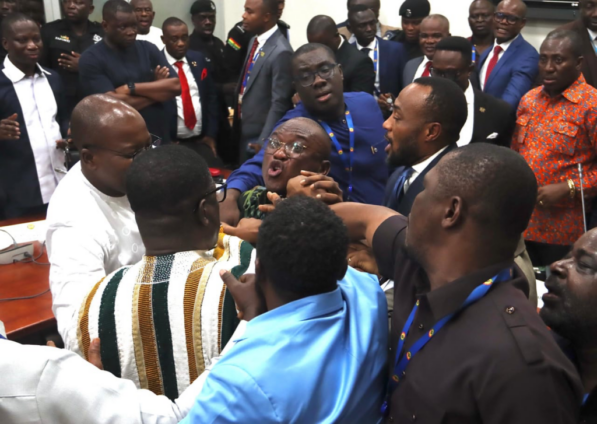In a dramatic turn of events, four Members of Parliament (MPs) in Ghana were suspended for two weeks following a chaotic incident during the Appointments Committee’s recent sitting.
Speaker Alban Bagbin has taken a definitive stand against breaches of decorum, emphasising that such conduct is unacceptable in a legislative environment meant to uphold democracy and order.
The Incident
On Thursday, during the vetting of ministerial nominees, a conflict erupted that led to physical altercations among MPs.
Reports indicate that the disorder escalated to the point where tables and microphones were damaged, and some MPs nearly engaged in a fistfight.
Speaker Bagbin condemned the behaviour, labelling the incident as an embarrassment not just to Parliament but also to the country.
The suspended MPs are:
- Rockson Nelson Dafeamekpor (Majority Whip)
- Frank Annoh-Dompreh (Minority Whip)
- Alhassan Sulemana Tampuli
- Jerry Ahmed Shaib
Speaker Bagbin’s Response
In response to the chaos, Speaker Bagbin established a committee to investigate the circumstances surrounding the uproar.
He directed the Parliamentary Marshal to restrict the access of these MPs to the chamber during the suspension period, underscoring the seriousness with which Parliament views such disruptions.
In his statements, Bagbin conveyed disappointment about the conduct of the MPs, stressing that it tarnished the reputation of the legislative body.
By taking swift action, the Speaker aims to restore discipline and mitigate the likelihood of future incidents.
Bagbin warned MPs that any repeated occurrences could result in even stricter consequences, highlighting the need for respect and civility within parliamentary proceedings.
Impacts on Parliamentary Proceedings
The implications of this suspension extend beyond the immediate actions against the four MPs. It raises critical questions about the current state of Ghana’s political climate and the functioning of its parliament.
With the Appointments Committee already under scrutiny, a renewed focus on maintaining order will be necessary to ensure smooth sessions in the future.
Moreover, the heated environment portrayed by the recent incident could hinder bipartisan efforts and collaborative governance.
Effective dialogue is essential in legislative processes; therefore, establishing trust and mutual respect among MPs should now be a priority to prevent further clashes.
Public Reactions
As with any high-profile incident involving public officials, reactions from the public and various stakeholders vary.
Some citizens have applauded Speaker Bagbin’s decisive actions, viewing them as a necessary step towards upholding parliamentary integrity.
Conversely, others argue that such measures might be politically motivated or insufficient in addressing deeper systemic issues within Ghana’s political parties.
Conclusion: A Call for Better Conduct
The recent chaos in Ghana’s Parliament underscores the importance of decorum and respect within legislative bodies.
By suspending the offending MPs, Speaker Alban Bagbin has not only sent a strong message about the standards expected of all parliamentarians but has also initiated a reflection on the broader challenges facing political discourse in the country.
Moving forward, both MPs and citizens must advocate for a more respectful and constructive environment conducive to productive governance.
In these times of political anxiety, Parliament’s role as a stabilizing force must be prioritized to maintain public trust and ensure effective representation.

